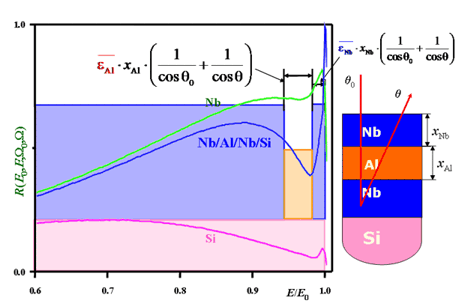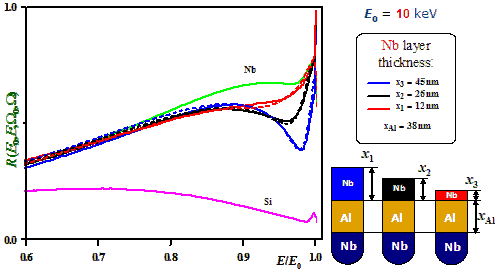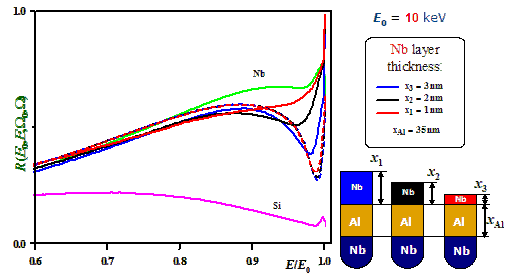Spectra of electrons
reflected from the
![]() Nb/Si two-layer
targets
Nb/Si two-layer
targets
![]() Nb/Al/Nb/Si multilayer
targets
Nb/Al/Nb/Si multilayer
targets
Theoretical interpretation
![]() Single-deflection
model & Continues slowing down approximation
Single-deflection
model & Continues slowing down approximation
![]() Consistent
solution of elastic and inelastic problems
Consistent
solution of elastic and inelastic problems
Fig. 1. Reflected electrons spectra q0 – incident
angle,
q - reflection angle, xNb –
thickness of the top Nb-layer, xAl – thickness of the
Al-layer, E0 – energy of incident electrons, R –
reflection function,
eNb - mean energy losses in Nb,
eAl - mean energy losses in Al.
Consistent
solution of elastic and inelastic problems The calculation of electron energy
spectra reflected from heterogeneous in depths targets is based on formulas
(7),
(9), (10),
(14).
Fig.2. Reflected electrons spectra Solid line shows experimental data, dashed line –
calculation for multilayer model. Varying of the top Nb-layer thickness
together with thickness of Al-layer for each target returns the Nb-layer
thickness the fits experimental data best (fitting-procedure).
Nb-layers and Al-layer thicknesses found with a help of
fitting-procedure are as following: x1=45 nm, x2=26,
x3=12 nm, xAl=38 nm.
Fig.3 Fitting-procedure There are only thicknesses of the
layers which varied in fitting-procedure. The model as such together
with all its parameters has been kept constant. Solid line – experiment
data, dashed line – calculation.![]() Fitting
Fitting
Single-deflection model &
Continuous slowing down approximation

